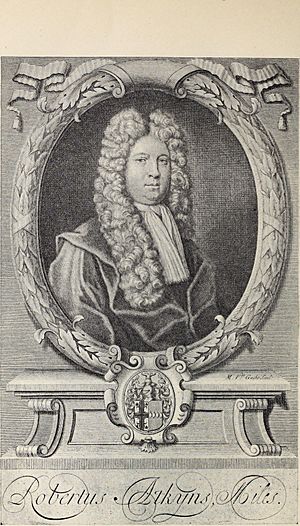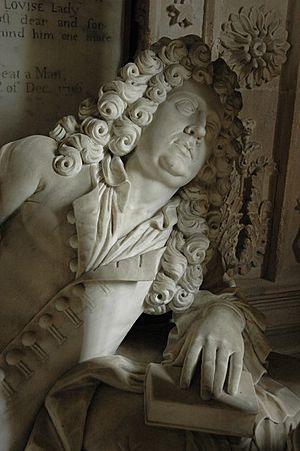Robert Atkyns (judge) facts for kids
Sir Robert Atkyns (1620–1710) was an important English judge. He served as a Lord Chief Baron of the Exchequer, which was a top legal position. He was also a Member of parliament and even the Speaker of the House of Lords, leading discussions in one of the two parts of the English Parliament.
Contents
Early Life and Family History
Robert Atkyns was born in Gloucestershire in 1620. His father, Sir Edward Atkyns, was also a judge during the time England was a republic, known as the Commonwealth. Robert's younger brother, Sir Edward Atkyns, also became a judge.
The Atkyns family had many lawyers for a long time. They had been involved in law for almost 200 years. Their family history in law goes back to the early 1400s! Robert Atkyns studied law at Lincoln's Inn, a famous legal school. He became a lawyer in 1645.
Joining Parliament and Becoming a Judge
In 1659, Robert Atkyns became a member of Parliament for Evesham. He was known to support the king. When King Charles II was crowned, Robert was made a Knight of the Bath.
Later, in 1661, he became a Member of Parliament for East Looe. He often spoke about legal issues in Parliament. People respected his knowledge of the law. He also became a King's Serjeant, a special type of lawyer for the king. Around this time, he was also made the recorder (a judge) for Bristol.
After the terrible great fire of London in 1666, he helped settle disputes as one of the "fire judges." In 1672, he became a judge in the Court of Common Pleas.
Important Legal Cases and Challenges
Sir Robert Atkyns was a judge during some trials related to the Popish Plot. This was a time when many people feared a Catholic plot against the king. While he believed in dealing with Catholics strictly, he was not as extreme as some other judges.
He was involved in a major civil case between Sir Samuel Barnardiston and Sir William Soame. This case was about how members of Parliament were elected. Atkyns disagreed with most of the court's decision. This marked the beginning of his disagreements with the powerful people in charge.
In 1679, he left his judge position. It seems he was forced to retire. He had upset some powerful people by speaking out against certain practices. For example, he didn't like the idea of Members of Parliament getting paid extra money (pensions) for their attendance. He believed they should not accept such payments.
Standing Up for Justice
After leaving his judge role, he moved to Gloucestershire. However, his strong opinions continued to cause him trouble. He was asked to run for Parliament again for Bristol, but he lost. Some people in Bristol even tried to make him give up his role as recorder.
Later, he helped Lord Russell, who was on trial for treason. Atkyns wrote legal advice to help Lord Russell and others who were in similar danger. He later published these letters, along with a strong defense of Lord Russell's innocence.
In 1684, he was involved in another important case. Sir William Williams, the leader of the House of Commons, was accused of publishing a story about the Popish Plot. Williams had acted on Parliament's orders. Atkyns argued that Parliament's actions were beyond the power of lower courts. Even though Williams lost, this case showed the importance of Parliament's powers.
Later Career and Legacy
Because he stood up for what he believed was right, Sir Robert Atkyns was recognized after the Glorious Revolution in 1688. In 1689, he became the Chief Baron, a very high judicial position. In the same year, he was appointed speaker of the House of Lords, leading the discussions in the House of Lords.
He held this important role until 1693. Parliament praised him for his work. He retired from being a judge in 1694, likely due to his age. Even in his later years, he continued to write about legal issues. He wrote about the power of the court of Chancery and the role of the House of Lords.
Sir Robert Atkyns spent his last years at Sapperton Hall in Gloucestershire. He passed away on February 18, 1710, just before his 90th birthday. He is remembered as a fair and honest judge during a time when there were many scandals in the legal system.
Family Life
Sir Robert Atkyns had one son, Sir Robert Atkyns the younger, with his first wife, Mary. Mary died in 1680. The next year, Sir Robert married Anne Dacres, who passed away in 1712. His son, Robert the younger, married Louisa-Margaret Carteret in 1669 but did not have any children.
His Writings
Sir Robert Atkyns wrote several important books and pamphlets about law and politics. These writings show his deep understanding of the legal system and his strong opinions on justice. Some of his notable works include:
- Parliamentary and Political Tracts: This collection includes his thoughts on various legal and political topics.
- An Enquiry into the Power of dispensing with Penal Statutes: This book looked at the history of how kings could ignore certain laws.
- A discussion on the ecclesiastical commission of 1686.
- An Enquiry into the Jurisdiction of the Chancery in Causes of Equity (1695): This book explored the powers of the Court of Chancery.
- A Treatise of the True and Ancient Jurisdiction of the House of Peers (1699): In this work, he discussed the historical role of the House of Lords in legal matters.
 | Selma Burke |
 | Pauline Powell Burns |
 | Frederick J. Brown |
 | Robert Blackburn |



